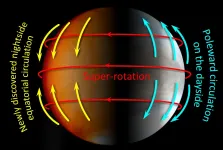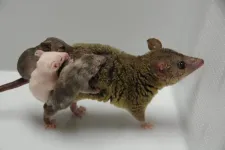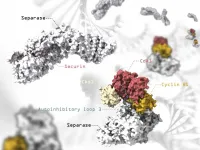(Press-News.org) The average American spends 5 days each year in line by some estimates. Many of these lines are for things like a cup of coffee, movie theater tickets or a ride on the newest roller coaster, but for some the wait is for something far more pressing -- a new kidney.
In South Carolina, the average time spent on a waitlist for a kidney transplant is 42 months, but according to a recent paper in JAMA Surgery, changes to the U.S. kidney allocation system could result in reduced access to kidney transplants and longer times spent in line.
"At face value, the changes in the allocation system seem quite appropriate," said Derek DuBay, M.D., director of transplant at MUSC Health and principal investigator on the study. "Everyone waits in line for the same amount of time. It's hard to argue with that." And yet he still disagrees.
There are three main components to transplant volume: organ allocation, a particular transplant center's aggressiveness for accepting organs, and a patient's geographical access to a transplant center. The Organ Procurement and Transportation Network (OPTN) addressed allocation inequalities by ensuring that all patients wait at least the same amount of time for a kidney rather than the previous geography-based model.
As the only transplant center in South Carolina, MUSC Health performs more kidney transplants per year than any other organ transplant in its program, which gave researchers an opportunity to predict the results of these allocation changes.
Kidney transplants are an important treatment option for patients. As the gold standard for chronic renal failure treatment, a kidney transplant can add 5 years to a patient's life expectancy, on average, compared to dialysis. DuBay says there are few things in medicine that confer a survival advantage of that magnitude as well as a great improvement in quality of life. His team looked at patients with end-stage kidney disease (ESKD) for this study, since kidney transplant is the best treatment option for these patients.
DuBay and his research team have the same goal as the OPTN: ensuring equitable access to organ donations. Recent results for ESKD patients, however, point to longer wait times for those in rural parts of the country than the times seen before the policy changes. DuBay points to the complexity of fair organ allocation to explain this effect. With more Medicaid expansion programs in urban areas, higher rates of insurance and closer proximity to transplant centers, patients in densely populated areas have more access to donated organs even if their wait times are longer.
While ESKD patients in South Carolina wait 3.5 years on average for a kidney, patients in New York City can wait upwards of 8 years. And while that appears to be unfair at first glance, DuBay says it's more complex than that. With a higher population density and high access to organ donation, patients in New York City are 3 times more likely to receive an organ despite the longer list than those in South Carolina.
DuBay likens the organ allocation equation to lines at a theme park. While it may appear that those in rural areas have a fast pass, he suggests the OPTN consider which patients to put on the list rather than the wait times of those already on the list.
"I think the important metric to consider is who gets into the theme park," said DuBay. "If waiting times are equal length, equal proportions of people with renal failure from South Carolina and New York City should be admitted to the park. Alternatively, if we let three times more people from New York into the theme park, for instance, then maybe they should wait a little bit longer."
Allocation can look like the right aspect to address, but DuBay points to access to transplant instead. "In South Carolina, we've been hit with a double whammy," he said. "You have patients with renal failure and ESKD whose chances of getting on the waitlist are already low. And now with the new allocation system, if they do get on the waitlist, they have an even lower probability of getting a transplant than before."
These policy changes are also predicted to result in a 40% decline in kidney transplant volumes for the state -- not due to a shorter waitlist, but due to reduced access to transplant.
This research reflects the importance of this access when looking at transplant volumes. "Organ allocation algorithms can't fix all of the inequities of organ transplantation," said DuBay. "And in fact, they can unintentionally worsen it." His goal is to bring public awareness and help his patients get the care they need.
"The average person in Sumter, South Carolina, should have the same opportunity and probability for a kidney transplant as those with renal failure in Chicago," he said. "It shouldn't be different because you have a different health care infrastructure or a different allocation system. The playing field needs to be leveled."
INFORMATION:
About MUSC Health
As the clinical health system of the Medical University of South Carolina, MUSC Health is dedicated to delivering the highest quality patient care available while training generations of competent, compassionate health care providers to serve the people of South Carolina and beyond. Comprising some 1,600 beds, more than 100 outreach sites, the MUSC College of Medicine, the physicians' practice plan and nearly 275 telehealth locations, MUSC Health owns and operates eight hospitals situated in Charleston, Chester, Florence, Lancaster and Marion counties. In 2020, for the sixth consecutive year, U.S. News & World Report named MUSC Health the No. 1 hospital in South Carolina. To learn more about clinical patient services, visit muschealth.org.
Common yeast are able to adapt and thrive in response to a long-term rise in temperature by changing the shape, location and function of some of their proteins. The surprising findings demonstrate the unappreciated plasticity in the molecular and conformational level of proteins and bring the power of molecular biology to the organismal response to climate change. Results from the Zhou lab at the Buck Institute in collaboration with the Si lab from the Stowers Institute are published in Molecular Cell.
Temperature is an unstable parameter in the wild, affecting almost ...
Little is known about the weather at night on Venus as the absence of sunlight makes imaging difficult. Now, researchers have devised a way to use infrared sensors on board the Venus orbiter Akatsuki to reveal the first details of the nighttime weather of our nearest neighbor. Their analytical methods could be used to study other planets including Mars and gas giants as well. Furthermore, the study of Venusian weather granted by their methods could allow researchers to learn more about the mechanisms underpinning Earth's weather systems.
Earth and Venus ...
Researchers at the RIKEN Center for Biosystems Dynamics Research (BDR) have succeeded in creating the first genetically engineered marsupial. This study, published in the scientific journal Current Biology, will contribute to deciphering the genetic background of unique characteristics observed only in marsupials.
Genetically modified animals, particularly mice and rats, are extremely important tools for researching biological processes. For example, researchers often silence genes to find out what their normal functions are. Since marsupials have unique characteristics, studying them requires developing ...
During cell division, chromosomes are duplicated and separated so that one copy of each chromosome is inherited by each of the two emerging daughter cells. Correct distribution of chromosomes requires high accuracy and defects in this process can cause aberrant distribution of chromosomes and facilitate cancer development. By analyzing the structure of the protein responsible for chromosome separation, an international team, led by scientists from the University of Geneva (UNIGE), has shed light on the mechanisms controlling this essential player in cell division. This work is published in the journal ...
MIT physicists have observed signs of a rare type of superconductivity in a material called magic-angle twisted trilayer graphene. In a study appearing in Nature, the researchers report that the material exhibits superconductivity at surprisingly high magnetic fields of up to 10 Tesla, which is three times higher than what the material is predicted to endure if it were a conventional superconductor.
The results strongly imply that magic-angle trilayer graphene, which was initially discovered by the same group, is a very rare type of superconductor, known as a "spin-triplet," that is impervious to high ...
What The Study Did: This study at an institution of higher education in Colorado evaluated the association between self-reported protective behaviors and how common SARS-CoV-2 infection was among essential in-person employees during the first six months of the COVID-19 pandemic in the United States.
Authors: Tracy L. Nelson, M.P.H., Ph.D., of Colorado State University in Fort Collins, is the corresponding author.
To access the embargoed study: Visit our For The Media website at this link https://media.jamanetwork.com/
(doi:10.1001/jamanetworkopen.2021.16543)
Editor's Note: The article includes conflict of interest and funding/support disclosures. ...
What The Study Did: In this analysis of the 2015 U.S. Transgender Survey, gender-affirming hair removal procedures were associated with lower odds of past-month severe psychological distress, past-year smoking and past-year suicidal ideation.
Authors: Michelle S. Lee, B.A., of Harvard Medical School in Boston, is the corresponding author.
To access the embargoed study: Visit our For The Media website at this link https://media.jamanetwork.com/
(doi:10.1001/jamadermatol.2021.2551)
Editor's Note: The article includes conflicts of interest ...
Alexandria, Va., USA - Parach Sirivichayakul, Mahidol University, Bangkok, Thailand, presented the poster "Preventing Approximal Caries in Primary Teeth With Topical Fluorides" at the virtual 99th General Session & Exhibition of the International Association for Dental Research (IADR), held in conjunction with the 50th Annual Meeting of the American Association for Dental Research (AADR) and the 45th Annual Meeting of the Canadian Association for Dental Research (CADR), on July 21-24, 2021.
There is limited evidence regarding the use of silver diamine fluoride (SDF) for caries prevention in primary teeth. This randomized clinical trial evaluated the effectiveness of 38% SDF, 5% sodium fluoride (NaF) varnish and ...
Chestnut Hill, Mass. (7/21/2021) - Researchers have discovered a "layer" Hall effect in a solid state chip constructed of antiferromagnetic manganese bismuth telluride, a finding that signals a much sought-after topological Axion insulating state, the team reports in the current edition of the journal Nature.
Researchers have been trying to find evidence of a topological Axion insulating (TAI) state and developed some candidate materials based on theoretical calculations. The layered Hall effect represents the first clear experimental evidence of the state, a feature bound by the laws of quantum physics, according to Boston College Assistant Professor ...
PHILADELPHIA--Investing in structural home repairs in historically segregated, low-income, Black and Latino neighborhoods has been associated with reduced crime rates. In Philadelphia, when a home received repairs through a city-funded program, total crime dropped by 21.9% on that block, and as the number of repaired houses on a block increased, instances of crime fell even further, according to research from the Perelman School of Medicine at the University of Pennsylvania published today in JAMA Network Open.
In an effort to address an old housing stock and high levels of historical disinvestment in Philadelphia, the city implemented the Basic Systems Repair ...



